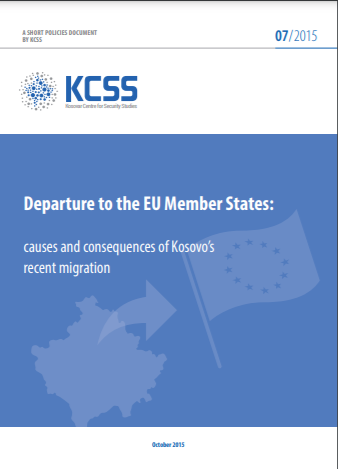6/10/2015

Kosovar Centre for Security Studies (KCSS)
Balkan Trust for Democracy (BTD)
Plator Avdiu
According to official statistical data, it is estimated that around 75,000 Kosovo citizens have migrated to the European Union, mainly to Hungary and Germany through Serbia, only from October 2014 to March 2015. Given that this number represents those who have actually officially sought asylum, the total number of migrants who continue to reside illegally is much higher than 75,000, As a result, during this period Kosovo ranked among the top five countries from where asylum applications were made in at least one of the European Union Member States. Irregular migration from Kosovo presents yet another challenge for Kosovo, since the European Union’s stance is that the number of Kosovo asylum applications to the European Union needs to fall before any recommendation can be made in regards to the visa-free regime for Kosovo.
Through this paper, Kosovar Centre for Security Studies, aims to provide reasons behind Kosovo’s recent migration flow towards the European countries. Accordingly, our research indicates that there are three main reasons behind recent wave of migration from Kosovo: (1) lack of socio-economic perspective in Kosovo; (2) smuggling of migrants, and (3) the absence of cooperation between the law enforcement agencies of Kosovo and Serbia, that is to say between the Kosovo Police and the Police of Serbia. Apart from economic factors which are seen to be the main reasons for migration, a sharp surge in the number of migrants to the EU is considered to have occurred as a result of networks of smugglers operating in Kosovo and Serbia that were smuggling migrants in order to take them to the European Union through Serbian legal and illegal routes. Furthermore, there was no police cooperation between Kosovo and Serbia to combat organized crime networks, which could prevent illegal migration.